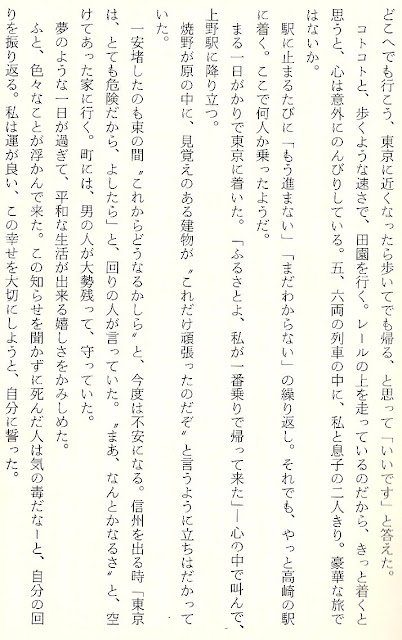Pilgrimage (junrei)
Walking humbly with the power of nature
to arrive at enlightenment
is one kind of meditation practice, is it not?
My birth name is Hiroko but when I wrote this diary I used the name Suigetsu, given to me by my long-time tea ceremony master. Suigetsu means Moon Water. The moon represents truth. There is only one moon and only one truth. The water represents the heart, which is changeable, sometimes pure, sometimes not pure. The truth is so beautiful that to really see it you must look with a pure heart. The heart must be continuously cleaned because it gets dirty, like water. When you see the truth it will shine on your heart like the moon on water. The pure heart, like still clean water, will be able to reflect the truth clearly. There is a well-known Zen saying, mizu o tsueba tsuki te ni ari, which means, if you scoop up water you hold the moon in your hands. The moon does not plan where it is going to reflect, it just naturally happens where the light falls. Likewise the water does not try to attract the reflection of the moon. They are both naturally there and the process of reflection just occurs naturally. In the same way the truth will naturally reflect from a pure heart.
Everyone’s life is different, nobody walks the same way. Only I can walk my life. Forty-six years of my life had passed when I wrote this diary. The Great Pacific War was over. More than twenty years have gone by. After the war Japan Japan Japan Okinawa , the only place in Japan
After the war I wanted to do something special to remember senshi-sha, the people who died in the war. Perhaps it should be a spiritual journey, a traditional pilgrimage by foot from Kyōto Tōkyō
I waited twenty years. My children grew up and my husband and I moved from Tōkyō Nara 6 October 1967 , I started from my home, alone. I had asked that no one come to say goodbye so I left before sunrise and took the first train from Nara Kyōto
When I set out on foot early in the morning, I saw many white bush clover, a flower that blooms only in autumn. They were bent over with dew as if they were bowing and saying sayōnara.
As I said, it is six hundred kilometers from Kyōto Tōkyō








No comments:
Post a Comment